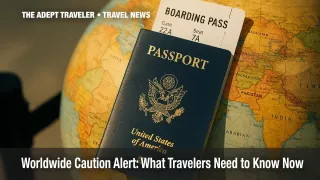Worldwide Caution Alert: What American Travelers Need to Know Now

The U.S. State Department's new worldwide caution alert arrives just as President Trump's strikes on three Iranian nuclear facilities jolt the Middle East. Airspace closures, suspended flights, and fast-moving security warnings have followed, forcing U.S. travelers to reassess summer plans and prompting fresh questions about how to navigate a region suddenly on edge.
Key Points
- State Department issues first worldwide caution in almost two years.
- Airlines halt service to Dubai, Doha, Abu Dhabi, and Tehran.
- U.S. Embassy in Qatar urges Americans to shelter in place.
- DHS terrorism bulletin warns of a "heightened threat environment" at home.
- Why it matters: Travelers face cascading disruptions far beyond the conflict zone.
Worldwide Caution Alert Snapshot
The alert, released June 22, cites "increased potential for demonstrations against U.S. citizens and interests abroad" and warns of ad-hoc airspace closures across the Middle East. Travelers are urged to enroll in the Smart Traveler Enrollment Program (STEP), monitor official channels, and draft contingency plans before departure. The Federal Aviation Administration has already banned U.S. carriers from overflying Iranian airspace, while the European Union Aviation Safety Agency flags Israel, Iraq, and Syria as high-risk corridors.
Background Brief
Worldwide caution notices are rare; the last broad alert followed the October 2023 Hamas attacks in Israel. This new notice stems from escalating tit-for-tat strikes between Israel and Iran that have spilled across proxy fronts since early 2024. Tehran's missile salvos on Tel Aviv triggered a temporary closure of Ben Gurion International Airport (TLV), and Washington's subsequent strikes on underground Iranian sites opened a dangerous new chapter. Regional carriers have weathered previous flare-ups, yet analysts note that this is the first time since 1991 that Gulf hubs such as Dubai International (DXB) and Hamad International (DOH) faced widespread schedule freezes by North American and European airlines.
Latest Developments
Commercial aviation felt the shock wave first. American Airlines and United Airlines suspended their flagship Newark-Dubai and Philadelphia-Doha services through at least July 3, mirroring steps by British Airways, Singapore Airlines, and Air Canada. Gulf carriers responded in kind-Emirates halted flights to Tehran, Baghdad, and Basra, while Etihad described the situation as "highly dynamic" and warned of sudden airspace closures that could strand aircraft and crews.
Long-haul reroutes through Turkish and Saudi corridors have added as much as two hours to Asia-bound journeys and pushed jet-fuel costs higher. Routes between Europe and Southern Africa now detour well west of the Strait of Hormuz, creating congestion in Cairo and Jeddah flight-information regions.
On the ground, the U.S. Embassy in Qatar issued a shelter-in-place advisory on Monday, recommending that citizens know their nearest hardened shelter and avoid all non-essential travel to Al Udeid Air Base. In Israel, the embassy is coordinating assisted-departure flights for tourists and dual nationals. Tel Aviv's Ben Gurion reopened Monday for 24 tightly controlled repatriation flights under "Operation Safe Return," with priority given to medical evacuations and stranded youth tour groups. Lufthansa plans to restart limited Frankfurt-Tel Aviv service on June 23, but tickets are restricted to citizens, residents, and credentialed aid workers.
Beyond aviation, the Department of Homeland Security released an NTAS bulletin valid through September 22, warning that sleeper-cell rhetoric from Tehran heightens domestic risk. Critical infrastructure operators have moved to a "Shields Up" cyber posture, while state fusion centers track upticks in threat chatter targeting Jewish, Arab, and Iranian-American communities.
Travel-insurance providers are updating coverage triggers almost daily. Policies purchased before June 21 generally honor trip-cancellation claims tied to the new worldwide caution. After that date, "known event" exclusions may apply, so travelers should confirm benefits and consider a travel-advisor-vetted 'cancel for any reason' upgrade before rebooking. (See our internal guide to comprehensive travel insurance options for details.) Analysis
For leisure travelers, the most immediate consequence is uncertainty. Even if a destination remains technically open, last-minute airspace closures can strand passengers mid-journey or force expensive detours. Cruise itineraries that call at Gulf ports face similar volatility; some lines have started swapping Muscat for Mumbai with minimal notice.
Business travelers should prepare for elevated security screenings at major U.S. gateways as TSA and Customs officers implement DHS surge protocols. Allow extra time, maintain soft copies of vital documents, and store an emergency stash of small-denomination U.S. bills-a tactic long recommended in our guide on carrying money safely. Clients whose work takes them near strategic energy or defense sites should coordinate with in-house security teams and local fixers to map rally points and alternate exit routes.
Families headed to more stable regional hubs such as Amman or Istanbul still need contingency plans. Buy flexible airfares, avoid tight connections through Gulf hubs, and keep hotel bookings refundable. A seasoned travel advisor can reroute quickly if a carrier grounds its fleet or a government closes its border. Finally, every traveler-no matter the destination-should enroll in STEP and monitor alert levels in the State Department's mobile app. These low-effort steps often make the difference between a stressful delay and a full-blown crisis.
Final Thoughts
Until tensions cool, flexibility is the traveler's best insurance. Build extra time into itineraries, keep communications gear charged, and stay subscribed to real-time updates from your advisor and official channels. When booking new trips, favor refundable rates and multipoint travel-insurance coverage. Above all, maintain situational awareness; today's worldwide caution alert underscores how fast conditions can change and why informed, prepared travelers fare best.
